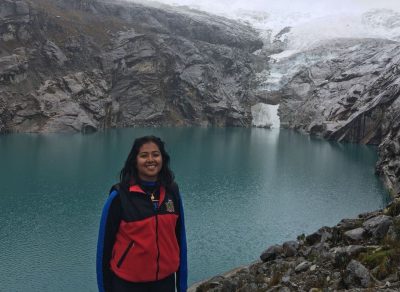Q&A with Andrea Mendoza, MPH Candidate in Global Health
Why did you decide to study global health?
When I think about why I decided to study global health I see different snapshots throughout my life that all influenced my decision. I took a class my second semester of college on global health and human rights, especially as they relate to the challenges faced by women around the world. This course led me to many others, culminating in a capstone project and internship with Latinx farmworkers in North Carolina. Following my college graduation, I lived in Peru for two years assisting with various community health related projects, and this experience solidified my desire to pursue a degree in global health in order to develop better tools to partner with communities to reduce health disparities and achieve health equity.
For your summer practicum, you worked with the SER Hispano Project. Can you tell us a little more about that project and your work?
I first learned about Dr. Nagy’s work on acculturative stress at the Minority Health Conference earlier this year. Growing up in North Carolina as a child of Mexican immigrants, I often witnessed the stressors that my parents experienced as they adapted to life in the United States. Dr. Nagy’s work spoke to me and I became involved in the SER Hispano Project, a research study funded by the National Institute on Minority Health and Health Disparities studying the effects of acculturation stress and resilience on the health and wellbeing of Latinx immigrants in the Research Triangle Area. The SER Hispano Project seeks to gain new knowledge on how individual, family, and community resilience among the Latinx population buffers against this acculturation stress and influences both psychological and physical health. I am assisting with the qualitative analysis and conducting a literature review to help inform future research that will adapt existing evidence-based treatments for depression to address the needs of highly stressed Latinx immigrants.
What is your dream job?
My dream job is to continue to work towards eliminating mental health disparities in the Latinx population. I would love to be able to work alongside community leaders and stakeholders in this area to capitalize on the strengths of the Latinx community in designing effective interventions. My summer practicum experience has also made me realize how much I enjoy working with my community and other Latinx professionals, which has been instrumental in helping shape my future plans post grad school.
Will you tell us about your favorite class at Gillings?
My favorite class at Gillings so far has been HBEH 710 Community Capacity, Competence, and Power: Community-Based Participatory Research (CBPR) and Photovoice. Photovoice is a participatory health strategy that provides individuals with cameras to document their lived experiences and share them with others in order to bring about change. In this class I learned about what it might look like to be engaged in CBPR work and what it means to work alongside communities by centering community strengths and priorities. Unfortunately, the pandemic affected our ability to conduct a fieldwork photography project with community members; however, learning about photovoice techniques and applying those techniques with other students in the class were invaluable takeaways.
What have been your favorite pastimes throughout the pandemic?
I have enjoyed taking long walks and discovering new trails. Brewing kombucha has also been a really rewarding hobby, and I am enjoying getting to try out new flavors! In addition, I have attempted to start some new hobbies, such as jewelry making. Hanging out with my two dogs, who are very happy that I am around nearly all day, is also a fun pastime.
